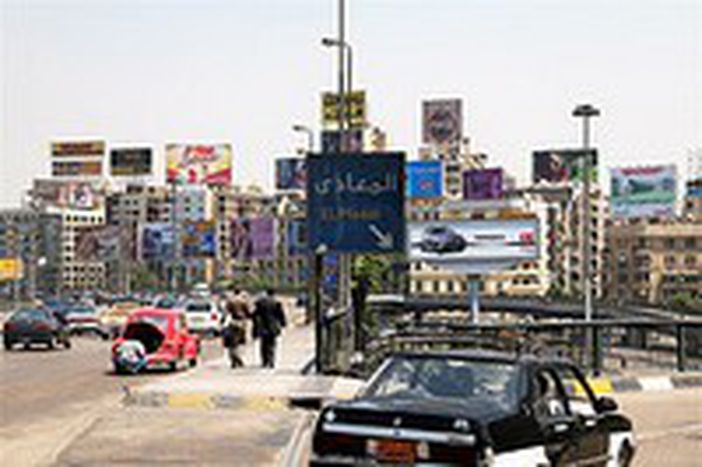
A taxi ride through Cairo
Published on
Translation by:
 Lucy Davies
Lucy Davies
Strange cities, cosmopolitan hearts - Europeans describe their summertime visions of the city through the eyes of a taxi
From our apartment on the 12th floor we can see over the rooftops of Cairo, the many windows and satellite dishes, a couple of billboards here and there, the brand names buzzing like birds over a sky full of smog.
Further below, on the indiscernible streets, cars, minibuses, horses and carts, mopeds, and most notably taxis are swarming around. Day and night they go about their business, a flock of black and white metal, synthetics and plastic, repaired countless times in backyards and side streets and put back together again as new. They are everywhere, in every corner of the city; everywhere, on both sides of the street.
The back seat of the taxi is coated with dust and dirt. The seats are completely worn; the black plastic coating is peeling away from the backrests in some places, revealing an indefinable brown mass inside. It is one of the many taxis which have already been in service on Cairos’ streets for many years. The left wing comes from another make of car and is so rusty that it just cannot be profitable to repair it.
The taxi driver is a young guy in his mid twenties at most. Instead of the Quranic chants preferred by older colleagues, he likes to listen to Arabic music. In comparison with the age of his vehicle, the radio with its tape deck is astonishingly new. He fiddles with the dials for a long time, until he comes across an English language station with British chart music. Perhaps he wants to do me a favour, though that is certainly a good reason to hike the journey price by a few pounds.
It is late afternoon. I am on my way to meet some friends in front of the language school at the ‘Khan al Khalili’ bazaar. Bad timing I realise - the ‘26th of July Street’ is completely at a standstill. We are completely trapped in a cloud of exhaust and the noise of honking horns. The attempts of my driver to weave his way through the lines of traffic by slamming his horn and flagellating his arms ends behind a taxi that tries a similar manoeuvre and does not get through either.
In Cairo, the car horn is absolutely the means of communication. They come in many variations, from your standard model to the upgraded polyphonic super horn which unexpectedly howls from a car that is otherwise completely decrepit.
Someone told me that Cairo motorists have a kind of secret language of different horn codes with which they can either pleasantly greet or insult the driver in the neighbouring car. I no longer remember exactly the subtleties of the sequences, only that the sound of the horns emitting from the cars around me have a rather aggressive undertone.
The air in the car becomes ever stifling and smells strongly of petrol. I try to wind down the window, but this is a taxi without a lever to open it, although it does have a functioning door handle. The driver notices my endeavours and, as we are completely stuck there, gets out of the car to fetch the pliers from the boot, using them to turn the window down. The air which is now flowing in from outside is no fresher, but anyhow moves a little.
Over the roofs of the other cars, I observe the sooty facades of the houses and the white and colourful clothes hanging from washing lines fluttering in front of windows. I remember the Bedouin who, at a crossroads during my first taxi ride, was suddenly standing on his horse next to our car. He and the driver exchanged a few friendly words and, as the traffic policeman finally waved us through, the Bedouin dug his heels into the flanks of his horse and the taxi driver put his foot firmly on the accelerator. For a short moment the rider galloped forward down the middle of the main road at eye level next to our taxi before disappearing, laughing and waving, in the rear view mirror.
Gradually, the traffic jam dissipates and we come to a traffic light. The next day and the next week will be exactly the same: stop, go, honk, accelerate, honk, brake and honk again. Soon I am able to explain to the taxi driver in Arabic that I have to go left under the bridge at the end of the street to reach the school – and often, he repeats the sentence again to me in perfect English. Here in Cairo, there are many reasons to become a taxi driver, all sorts of people drive through the city's congested streets. I remember Khaled al-Khamissi’s Taxi - Hawadit al-mashawir ('Taxi Speak'), and the different voices of Cairo’s taxi drivers that the book captures with their often unusual opinions and life stories.
From our apartment on the 12th floor we cannot see many taxis, we can only hear them. They are part of the carpet of noise which spreads out over the whole city 24 hours a day. It is not easy to escape. In Cairo there is no silence, only the occasional absence of noise.
Translated from Mit einem Taxi durch Kairo


